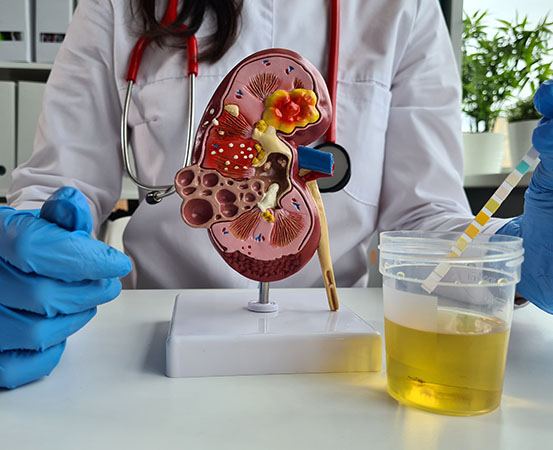
Schools of traditional medicine stumbled upon the earliest version of the condition that we know as diabetes today when they noticed ants flocking to urine puddles due to the presence of sugar in them. However, the presence of glucose in urine is not only an indicator for diabetes, but also for other serious conditions (especially the ones pertaining to our kidneys along with urinary tract infections). These conditions not being diagnosed or addressed on time could result in serious health complications.
READ MORE :
All you need to know about excess uric acid
What urine tells about your health
Urinary incontinence: Not a chronic embarrassment
What is glycosuria?
The presence of sugar in urine is clinically termed as glycosuria. Dr Garima Aggarwal, consultant nephrologist and renal transplant physician, Manipal Hospital, Bengaluru, says that the most common form of glycosuria is called glucosuria, which is diagnosed when an excess amount of glucose is excreted in the urine. She also adds that in case of glycosuria, the urine will also have traces of other forms of sugar (like fructose and lactose) apart from glucose. These are either ingested through food or released as by-products of various metabolic reactions.
Role of kidney in managing glucose
Normally, the kidneys filter the blood, thereby removing waste products and excess fluids. They also reabsorb glucose, amino acids and electrolytes (like sodium and potassium) back into the bloodstream. The renal tubules are responsible for glucose reabsorption and it’s done by specialised cells called proximal convoluted tubule cells. These cells have specialised transporters called SGLT2, which actively transport glucose from the tubular lumen back into the blood.
“When blood sugar levels are high, the amount of glucose in the bloodstream exceeds the reabsorption capacity of these transporters. As a result, glucose spills into the urine, leading to glycosuria,” says Dr Aggarwal.
Experts say that people with glycosuria do not have any symptoms at all and the condition is typically diagnosed through a urine test (which can detect the presence of glucose in the urine).
Potential causes of glycosuria
Hyperglycaemia
Dr Aggarwal says that in people with diabetes, either the pancreas is unable to secrete insulin or the secreted insulin is unable to effectively break down glucose (type 2 diabetes). This could often lead to an excess of glucose in the bloodstream beyond the renal threshold (glucose reabsorption capacity of the kidneys). The excess glucose leaks into the urine along with other waste materials and causes glycosuria.
“When the blood glucose level is more than 180 mg/dL, the excess sugar will be spilled into the urine,” she adds.
Kidney disease complications
“In case of healthy kidneys, glucose is reabsorbed back into the bloodstream,” says Dr Aggarwal. However, chronic kidney disease (CKD) damages renal nephrons responsible for filtration and reabsorption leading to leakage of glucose in the urine. The nephron damage could be more extensive in people with diabetes as high blood glucose could also damage the blood vessels in the kidney, affecting its normal functioning. Glucosuria in diabetics could be an indicator of diabetic kidney disease (DKD). Glucose will be present in urine in both these conditions and experts recommend urine tests for diagnosing kidney disease.
Renal glycosuria
Dr. Vijay Kiran, senior consultant nephrologist and kidney transplant physician, Asian Institute of Nephrology & Urology, Siliguri, points out that in some people, glucose could be detected in urine even without diabetes.
“If sugar or glucose is present in the urine despite normal blood sugar level, the condition is called renal glycosuria, which is rare. This occurs because the renal tubules in the kidneys do not work properly and are unable to efficiently reabsorb glucose back into the bloodstream, resulting in glucose spilling into the urine, he adds. Most people with renal glycosuria have no visible symptoms.
Dr Kiran adds that severe glycosuria could lead to osmotic diuresis, which is a condition that involves increased urination due to the presence of certain particles in the fluid filtered by the kidneys. This fluid eventually turns into urine. The process of osmosis created by these substances cause additional water to spill into the urine, thereby increasing its volume.
Fanconi syndrome
Another cause of glycosuria is Fanconi syndrome, a rare genetic disorder that affects the proximal tubules of the kidneys. Dr Aggarwal says that in people with Fanconi syndrome, the reabsorption capacity of essential amino acids and glucose is severely crippled. Fanconi syndrome is detected in some people after renal transplant procedure and also as a side effect of some medications.
Glycosuria and UTIs
According to the National Association For Continence (NAFC), too much sugar may lead to more frequent urinary tract infections. Additionally, sugar increases the acid level in urine, creating a better environment for bacteria to grow. Dr Shaival H Chandalia, endocrinologist and diabetologist at Jaslok Hospital & Research Centre, Mumbai, says that if somebody with uncontrolled diabetes is passing sugar in the urine, it can increase the risk of urinary tract infections.
Management of glycosuria
To manage glycosuria, the underlying cause of the condition must be identified and treated. Regular monitoring of blood sugar levels and urine tests can help in identifying the underlying condition. Experts suggests some ways to manage glycosuria:
- Diet and exercise: A healthy diet and regular exercise can help to control blood sugar levels and prevent hyperglycaemia (which can lead to glycosuria).
- Proper hydration: Drinking enough water and avoiding dehydration is important for preventing high glucose concentration in the urine.
Takeaways
- Presence of excess glucose in urine is called glycosuria and it could be a sign of either diabetes or kidney related complications.
- Experts suggest that early diagnosis and treatment is vital to ensure minimum renal damage and other diabetes related complications.
- High blood glucose in urine could also trigger urinary tract infections in some people. Managing blood sugar levels and maintaining a kidney-friendly lifestyle are the best ways to prevent these issues.
- Some rare versions of glycosuria could manifest due to genetic reasons even without diabetes.

















